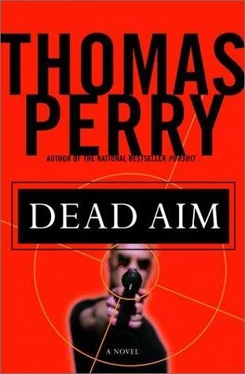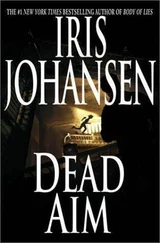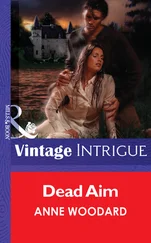Thomas Perry - Dead Aim
Здесь есть возможность читать онлайн «Thomas Perry - Dead Aim» весь текст электронной книги совершенно бесплатно (целиком полную версию без сокращений). В некоторых случаях можно слушать аудио, скачать через торрент в формате fb2 и присутствует краткое содержание. Жанр: Триллер, на английском языке. Описание произведения, (предисловие) а так же отзывы посетителей доступны на портале библиотеки ЛибКат.
- Название:Dead Aim
- Автор:
- Жанр:
- Год:неизвестен
- ISBN:нет данных
- Рейтинг книги:4 / 5. Голосов: 1
-
Избранное:Добавить в избранное
- Отзывы:
-
Ваша оценка:
- 80
- 1
- 2
- 3
- 4
- 5
Dead Aim: краткое содержание, описание и аннотация
Предлагаем к чтению аннотацию, описание, краткое содержание или предисловие (зависит от того, что написал сам автор книги «Dead Aim»). Если вы не нашли необходимую информацию о книге — напишите в комментариях, мы постараемся отыскать её.
Dead Aim — читать онлайн бесплатно полную книгу (весь текст) целиком
Ниже представлен текст книги, разбитый по страницам. Система сохранения места последней прочитанной страницы, позволяет с удобством читать онлайн бесплатно книгу «Dead Aim», без необходимости каждый раз заново искать на чём Вы остановились. Поставьте закладку, и сможете в любой момент перейти на страницу, на которой закончили чтение.
Интервал:
Закладка:
He stepped back to be sure he could recognize it, then turned and moved off into the fenced-in land. He was still surrounded by trees, but he could tell that, somewhere off to his left, the land rose gradually to a ridge. He headed in that direction because he guessed that might offer him the safest way of observing the complex of buildings. The lights from the area near the gate and the driveway would not reach up there.
When Mallon had climbed for ten or fifteen minutes up the wooded slope, he came out into a field that led onto the ridge. He made out in the moonlight that it was only the first of at least three rows of foothills that stretched into the backcountry toward a high mountain range, without any glow of electric lights, or any lighter-colored gashes for roads. Just below the ridge where he stood were a couple of buildings. One was the size of a two-car garage, and the other was cabin-sized, both in the same plain style of rustic architecture as the buildings he had seen on his visit with Lydia.
He turned around to look down toward the buildings near the gate. There the slope was clear of trees and brush, like a field of clover and alfalfa. He could make out the main lodge, and now he could see all of the parking lot across the driveway. He counted six cars. He tried to decide what that meant. One would belong to Michael Parish, the man he and Lydia had spoken to. Diane had mentioned two women instructors and a man, which meant three more cars. That left only the Lexus the red-haired man had driven, and one other.
There was a second big building, this one with a high roof, like a barn. It had only high windows and skylights, but it was dark, so Mallon could not tell what was inside. He guessed it must be the gym that he’d heard Parish mention on his first visit, the place where they offered instruction in hand-to-hand fighting. Scattered around on the outskirts were six low buildings that he identified as barracks. Each had three doors on each side, so probably they were each divided into six private rooms with separate entrances. There was no sure way for him to tell how many of them were occupied, but from the six cars, he had to assume that at least two barracks were being used.
It was a difficult place for an intruder, he decided. The front gate, the parking lot, and the area around the main offices were bathed in light, even at this hour. The driveway, which he could now see deserved to be called a road, was lighted at intervals all the way to the big building he had identified as a gym. The living quarters were around the complex on the outer fringes, where it was darker and quieter. Any or all of them might be occupied by people who would hear a person walking by outside. The site did not offer any obvious places for someone like Mallon to enter and be sure of going unnoticed.
Mallon turned and looked away from the camp. Before he went down there, he would need to get a closer look at the buildings separated from the main complex. He had to be sure they weren’t occupied before he turned his back on them.
Mallon kept to the shadowy places where groves of trees had been spared. He made his way to the more distant of the two buildings first. It was a cabin. He moved cautiously along the wall, examining it as carefully as he could. The siding consisted of rough slats nailed vertically to the frame of two-by-fours at top and bottom to cover plywood sheets, then painted a light olive to blend into the landscape.
Mallon moved cautiously to the window on a narrow end of the building and looked inside. In the moonlight that shone through the windows he could see one room with three sets of empty bunk beds, a table, and six chairs. There was a bathroom, which was open. He could see three kerosene lanterns: one in the center of the table, and two hanging from wrought-iron supports high on the walls. The cabin looked primitive. Maybe it was an extra place to accommodate guests who wanted the illusion of roughing it, or maybe its purpose was isolation. It didn’t matter. There was nobody here now.
Mallon took off his jacket and pressed it against a windowpane near the latch to muffle the sound while he broke the glass with the butt of one of his pistols. Then he raised the window and climbed inside. He collected a lantern and a box of matches from the table, and went outside.
The walk to the second building was at least two hundred yards. Beside it was a wooden tower that he had mistaken for a big tree from a distance in the dark. It was on a ridge overlooking a dry riverbed that had been outfitted as a firing range. There were barrows of earth bulldozed up some distance away, where he could just make out a row of posts with white squares that were probably targets on them, and at one side, a wind sock. He knew what that was for. When he had been a boy shooting on the family farm, he had put one up himself, because the targets were far enough away so that on some days it had been necessary to adjust for the wind.
He stepped up to the garage-like building and examined it. The walls were painted the same color as the others, but now he could see that they were made of cinder blocks. He had a suspicion, a hope that he was right about what this building might be. He quickly walked around the building, looking for windows. The fact that there were none raised his hopes higher. When he reached the door and touched it, he was almost sure: the door was steel. This was the logical place to store the things they needed for the range: paper targets, the machinery for the pop-up combat targets, bench rests, spotting scopes. But maybe, just maybe, there would be other things inside that he could use.
Mallon examined the door closely. It opened inward so the hinges were not accessible, and there were three dead bolts set about a foot apart, so the door would be impossible for one man to batter in. The only way he could imagine opening it was with a cutting torch or a concrete saw. The cinder-block-and-mortar walls were impervious to anything he could do without tools.
He looked up and judged the distance between the spotting tower and the building. It was about eight feet, but the tower was a bit higher than the building’s roof. He climbed the ladder to the tower platform and looked again. It seemed a bit farther than it had from the ground, but he reminded himself that he had made his judgment before fear had added a few feet. He climbed up to the rail, bending to stay under the roof of the tower, and held on to one of its supports. He took a breath, and jumped.
He hit the roof of the building about halfway up, then dug hard with his toes and scrambled with his hands to keep from sliding off. After a moment he was able to stop himself, then lie on his belly with his toes holding him there. He took out his pocketknife.
Amateurs who wanted to make a building secure often overlooked a single design problem, and he was lying on it now. A composition shingle roof was designed to keep out the rain, not intruders. He used his knife to help him pry up short roofing nails so he could pull shingles from the roof. He went at it patiently, tugging off shingles and leaving the tarpaper beneath until he could feel the long line where two sheets of plywood met. He stripped the tarpaper off to expose the nails.
He dug into the wood around each of the nail heads with a cutting blade, just deep enough to get a purchase with the bottle-opener blade, then pry the nail up a bit. He went to his knees, put both hands under the sheet, and lifted. There was a creak, and the sheet of plywood came up. It acted as a lever to bend and partially extract the nails on the other edge, so he didn’t need to remove them. He held the sheet up like an open door and looked down into the building. It was too dark to see anything in the windowless space below.
Mallon took out the box of matches he had taken from the other building, struck one, and lowered it into the space as far as his arm would reach. The bare concrete floor was about twelve feet below him. He was fairly confident that he could drop straight down and not hurt himself, but even more certain that he would not be able to get back out. The match burned close to his fingers. He turned its head upward so that it would not burn him, then in a few seconds had to let it drop. Just before it went out, he saw the distinctive color of fresh pine board.
Читать дальшеИнтервал:
Закладка:
Похожие книги на «Dead Aim»
Представляем Вашему вниманию похожие книги на «Dead Aim» списком для выбора. Мы отобрали схожую по названию и смыслу литературу в надежде предоставить читателям больше вариантов отыскать новые, интересные, ещё непрочитанные произведения.
Обсуждение, отзывы о книге «Dead Aim» и просто собственные мнения читателей. Оставьте ваши комментарии, напишите, что Вы думаете о произведении, его смысле или главных героях. Укажите что конкретно понравилось, а что нет, и почему Вы так считаете.












